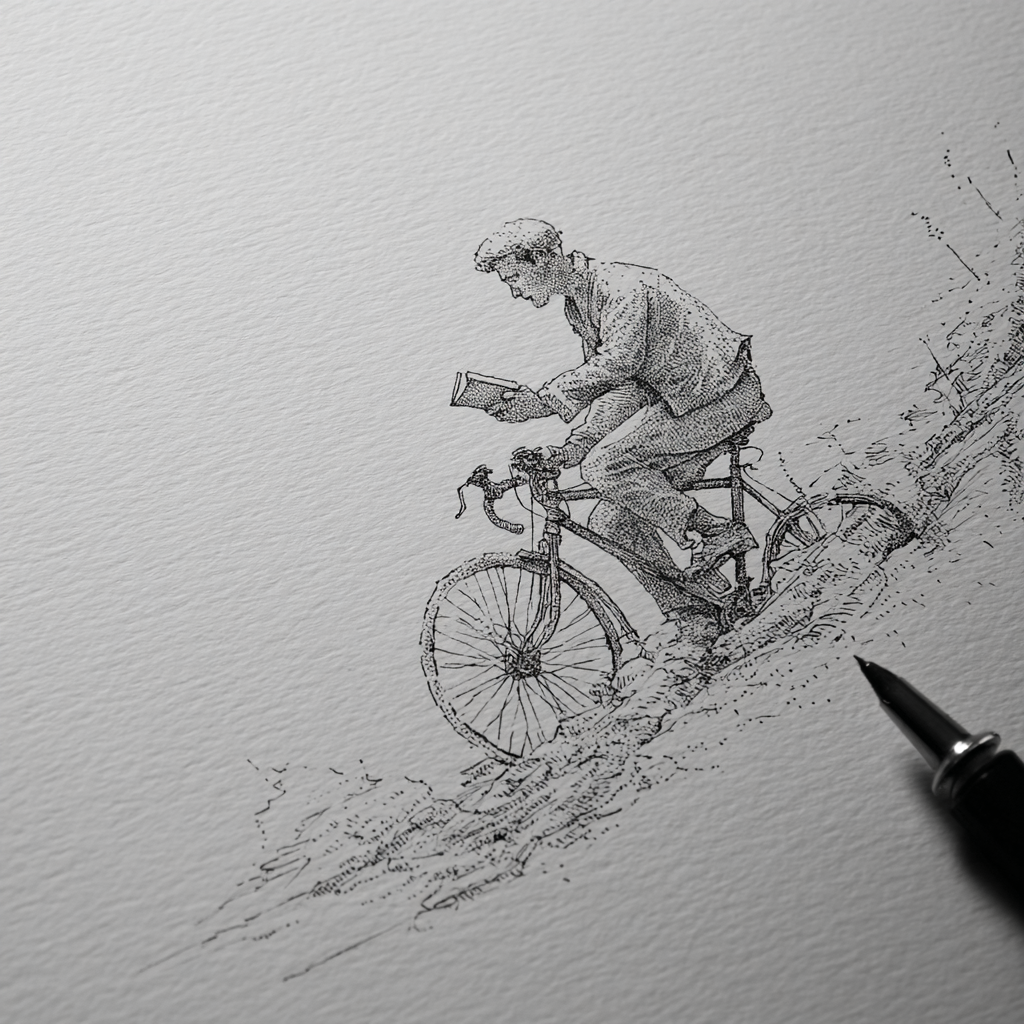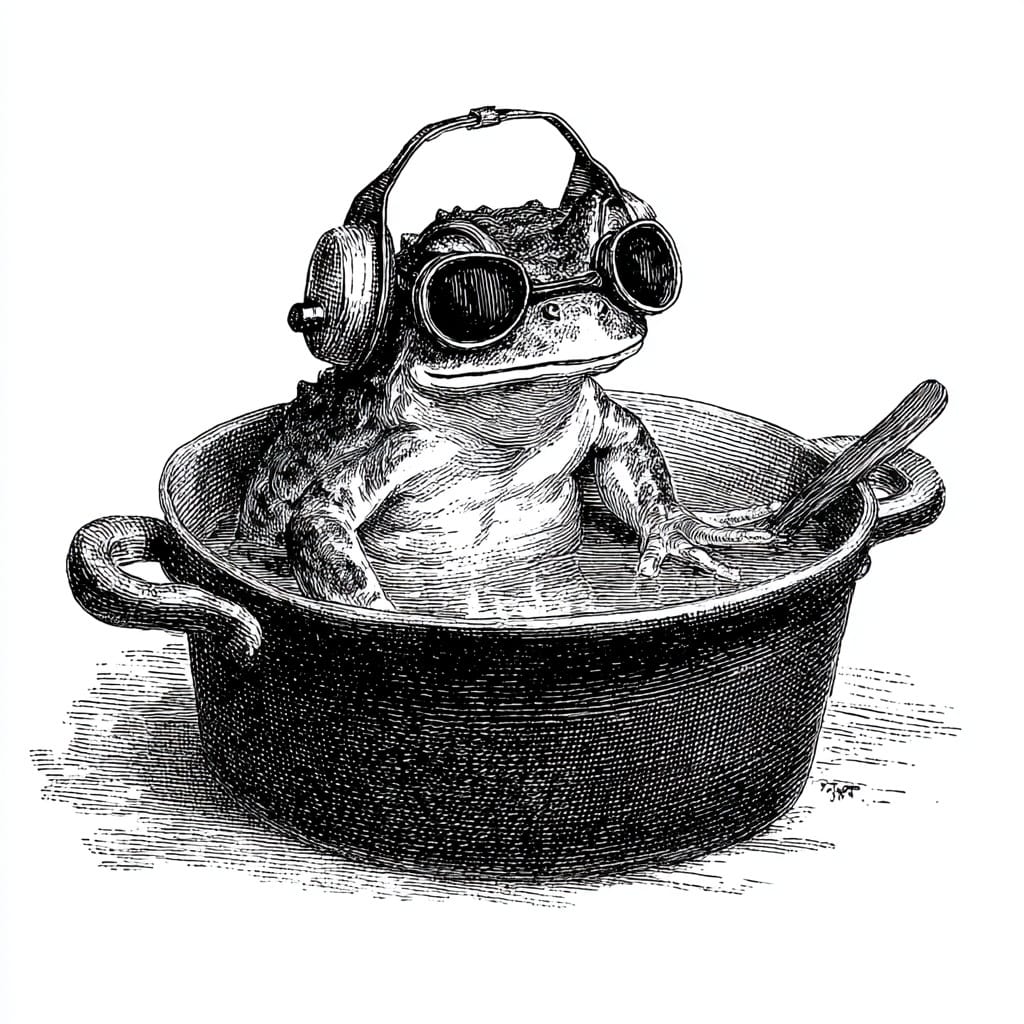Craft before Content

If you are getting this post for a second time, apologies. There was a wrinkle getting Ghost to do this, now resolved. (note, good service once problem surfaced)
We’ve read the books on strategy, taken the courses on innovation, and attended the conferences on leadership. Subscribed to the newsletters, listened to the podcasts, and collected the frameworks. And yet. We can't learn to ride a bike reading a book. We have to risk falling off.
When we face an actual decision with genuine consequences, one that matters for our sense of self, where the stakes are real and the answer isn’t in any framework we’ve learned, we’re still navigating by instinct. Sometimes it works. Sometimes it doesn’t, and it is frustrating to find that we’re not making the progress we would like at the thing that matters most: making sound judgements under uncertainty.
This isn’t failure. It’s the limitation of how we currently approach our individual professional development.
The Three Failures
Universities, business schools, and the self-help literature teach theory disconnected from consequence. You can ace the course, or love the book, without ever bearing the cost of a bad strategy.
You can master the frameworks without developing judgment. Academic rigour doesn’t translate to practical wisdom because there’s no skin in the game. Those who teach strategic decision-making have rarely had to bear the consequences of a strategic decision that could bankrupt a company or cost people their jobs, and too often what is written is retrospective, claiming credit for circumstances rather than having taken deliberate risks.
Corporations optimise for extraction, not development. Training exists to make us more useful to the organisation, not more capable as practitioners. The goal is standardisation; getting everyone to follow the same processes, which is precisely the opposite of developing craft. We’re being shaped to fit the system, not to transcend or transform it. Leadership development programmes produce better corporate functionaries, not better leaders. Online learning provides information, not transformation. We can consume infinite content. We can collect certificates and join communities and complete courses, and still make little difference.
Transformation requires more than information. It requires practice with consequences, feedback from people we trust, and sustained engagement over time. A Masterclass taught by a celebrity doesn’t develop capability; it provides the illusion of learning whilst we remain exactly where we started.
What’s Actually Missing?
Three things that can’t be packaged into content or scaled through courses:
Practice with consequence. Not case studies or simulations, but actual work where our decisions matter. Where we bear the costs of mistakes and the benefits of insights. Where learning happens through consequence, not through consuming information about consequence.
The difference is profound. In a case study, we can propose a bold strategy knowing there’s no downside if we’re wrong. In actual practice, we learn to calibrate risk differently because we’re the ones who have to live with the outcome. This calibration, this judgement, cannot be taught. It can only be developed through repeated exposure to real stakes.
Sustained conversation with practitioners. Not networking. Not masterclasses. Not therapy. Rather, genuine dialogue with people who are wrestling with similar challenges, who will push back on our assumptions, who care enough to tell us when we’re wrong.
Most professional conversations are performative. We present our polished thinking. Others nod appreciatively. Everyone protects their image. Nothing actually happens. What’s needed is conversation where people expose work-in-progress, challenge each other’s premises, and collectively make thinking better. This requires trust built over time, not manufactured in weekend workshops.
Time. Craft develops slowly. Not through intensive bursts or 90-day transformations, but through sustained practice over time. Through repetition and refinement and accumulated wisdom that comes from seeing patterns across contexts, from making the same mistake in different forms until we finally recognise it before we make it again.
Why This Matters Now
We’re culturally hostile to this truth. We want quick fixes, productivity hacks, frameworks that deliver immediate results. But the capabilities that actually matter—judgement, taste, wisdom—develop on geological timescales relative to our impatience.
The gap between what’s available and what’s needed is widening. As AI handles more routine work, what remains valuable is precisely what can’t be automated: the capacity for judgement, for taste, for knowing when the algorithm is wrong.
But we’re systematically failing to develop these capabilities. Universities still teach as if information scarcity is the problem. Corporations still optimise for conformity as if standardisation, whether human or digital, creates competitive advantage in a world of humans, none of whom are "standard". Online platforms still scale content as if more information solves the transformation problem.
Meanwhile, the practitioners who develop genuine craft do so almost accidentally, through lucky mentorships, unusual career paths, or sheer stubborn persistence. We’ve left capability development to chance in an era where it matters more than ever.
The Architecture Problem: What’s needed isn’t better content or more accessible material. It’s a different architecture entirely. Not information delivery but condition creation. Not scaling expertise but enabling peer development. Not optimising for milestones but designing for transformation over time.
The question isn’t “how do we make learning more efficient?” It’s “What conditions enable craft to develop?” This requires rethinking everything: structure, duration, selectivity, and economics. It means building something that doesn’t scale easily, doesn’t promise quick results, and doesn’t fit neatly into existing categories. It means accepting that not everyone can be accommodated, that meaningful development takes months and years, not weeks, and that the work itself must be demanding rather than convenient.
Increasingly, we’re also on our own. Corporations haven’t suddenly turned nastier, they just have more options than they used to, and the logic of shareholder value is relentless. We are more disposable than we used to be, and need greater resilience and “anti fragility” strategies more than we used to as the world of work becomes ever more febrile.
Building Together
The Athanor is our attempt to create these conditions, not as something we subscribe to, but as something we build together.
The core premise is that we can’t get where we need to go by repeating what we’ve already done. The challenges we face, navigating AI disruption, developing judgment under uncertainty, and building practices that resist commodification, don’t have established playbooks. The answers won’t come from doing what worked in the past more efficiently.
There is something important here about tangible actions. Firstly, taking “requisite risk”. It doesn’t have to be huge, but it does have to be real, and trades in results, not promises of results. Secondly, it's about moving out of our comfort zones and trying something that might fail, but teaches us in the process. Finally, there is also something about the nature of the community; one which, like the Lunar Society (of which, more in my next post), comprises a mix of both ‘doers’ and ‘thinkers’ who can energise each other.
So the Athanor is structured around small experiments. We test approaches in our own practices and businesses, with real stakes and real consequences. Then we share what we've learned—what worked, what didn't, and why we think it happened. The insights generated belong to everyone who
This approach has deep roots. In his book The Quiet Before, Gal Beckerman traces how radical ideas throughout history, from the scientific revolution to feminism, emerged not from loud public declarations but from "quiet, closed networks" where small groups could incubate ideas before broadcasting them.
His opening example is the Republic of Letters in the 1600s, where scholars like Nicolas-Claude Fabri de Peiresc utilised postal correspondence to connect Europe's greatest minds in a slow, deliberative process of experimentation and knowledge-sharing; dangerous work at a time when challenging church doctrine could result in being burned at the stake.
Historical alchemists worked in a similar tension: fiercely protective of their methods through coded language, yet bound by correspondence networks and shared workshops where they compared results from months-long experiments. What made these spaces effective was their slowness, the "gentleness, patience and immense effort it took to build trust and gradually win people over," allowing ideas to be refined through meaningful engagement rather than instant reaction. They competed for clients but collaborated on technique, validating discoveries through replication and troubleshooting failures together.
Their laboratories weren't just functional spaces; they were initiatory: you earned deeper knowledge by demonstrating patience and commitment through sustained practice. This is the approach I want to explore more fully in a later post: how communities of New Artisans balance protection and sharing, competition and collaboration, when working at the edge of what's possible.
This isn’t my programme. It’s our workshop that we shape together through what we bring, what we try, and what we discover actually works when we apply it in our own contexts. Not best practices to adopt, but working hypotheses to test. Not frameworks to implement, but questions to explore. Not someone else’s methodology to follow, but the collective capability we develop together.
The intention is that by the end of the month, we will have somewhere to start. A project we can develop. Until then, I will post thoughts and ideas here. I’d really appreciate yours as well, and you can mail me at richard@richardmerrick.co.uk. All responses will be confidential, so be as direct as you like...
On Monday, I’ll share some thoughts on a historical precedent for this kind of collective practice, and how it quietly catalysed what came next. Along the way, I'll share posts from other people and connections under the "sources" tab here on The Athanor. The one on "annoyance" is brilliant...

Comments ()